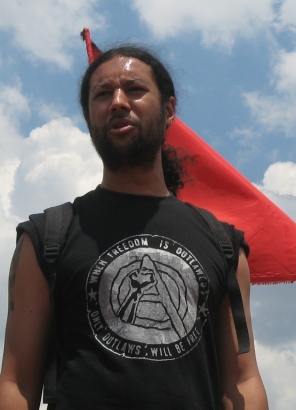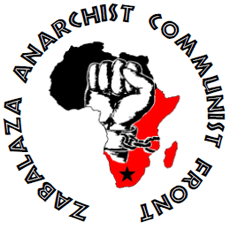 Warren McGregor of Zabalaza Anarchist Communist Front (ZACF) says while the South African state has been praised for its rapid response to coronavirus, its lockdown has hugely unequal effects . Many in the working class , poor majority lack proper access to food, health-care, income and jobs. Some employers are attacking labour. There are inadequate measures to cushion the masses, and unacceptable army /police brutality, while big business and politicians get bailouts. We accept the science that lockdowns are needed, he insists. But we must also demand justice, building concrete, realistic actions that can win improvements and build working class counter-power and a popular anarchist consciousness. Continue reading
Warren McGregor of Zabalaza Anarchist Communist Front (ZACF) says while the South African state has been praised for its rapid response to coronavirus, its lockdown has hugely unequal effects . Many in the working class , poor majority lack proper access to food, health-care, income and jobs. Some employers are attacking labour. There are inadequate measures to cushion the masses, and unacceptable army /police brutality, while big business and politicians get bailouts. We accept the science that lockdowns are needed, he insists. But we must also demand justice, building concrete, realistic actions that can win improvements and build working class counter-power and a popular anarchist consciousness. Continue reading
Interviews with and by the ZACF
Youtube: Anarchist-communist webinar on world’s health crisis, including ZACF/ Zabalaza, 11th April 2020
What does the crisis mean for the working class and poor, and for our struggles and strategic perspectives? The Zabalaza Anarchist Communist Front (ZACF), South Africa, participated in a recent online panel with sister organisations from across the world on 11 April 2020. For those who were unable to tune in, you can enjoy a video recording here:
The event was hosted by Black Rose / Rose Negra Anarchist Federation (U.S.). Cde Warren McGregor of ZACF makes many valuable points: a transcript of his points will follow in another post. Other participation was from Acción Socialista Libertaria (Argentina), Solidaridad (Chile), Union Communiste Libertaire (France) and Workers Solidarity Movement (Ireland).
VIDEO: What is it all about? Join the Zabalaza Anarchist Political School (ZAPS)!
Building black working class counter-power against state, capital and national oppression: Interviewing Warren McGregor, ZACF, South Africa
 Interview with Warren McGregor of the Zabalaza Anarchist Communist Front (ZACF),[1] South Africa: What is anarchism? Who really rules South Africa? Should we form a “workers party”? How does anarchism address racial and national oppression? How can we build working class counter-power? What is the state of the left? How do we link fights for reforms to revolutionary transformation and counter-power? Where does anarchism come from and what is its history in South Africa? Where to now?
Interview with Warren McGregor of the Zabalaza Anarchist Communist Front (ZACF),[1] South Africa: What is anarchism? Who really rules South Africa? Should we form a “workers party”? How does anarchism address racial and national oppression? How can we build working class counter-power? What is the state of the left? How do we link fights for reforms to revolutionary transformation and counter-power? Where does anarchism come from and what is its history in South Africa? Where to now?
Warren McGregor is an activist born in the Coloured townships of the Cape Flats, now resident in Johannesburg, where he is involved in working class and union education.
Leroy Maisiri (LM):[2] First of all thank you so much for your time, and making room for me in your busy schedule. Please kindly begin stating your name and any political affiliations you have with organisations or movements within the left.
Warren McGregor (WM): It’s a pleasure, but please call me “Warren.” I am a member of the Zabalaza Anarchist Communist Front (ZACF), as well as of the Tokologo African Anarchist Collective (TAAC), and I identify myself politically as an anarchist.
LM: It appears there is a new interest in forming a “worker’s party” in South Africa at present. Some people think the National Union of Metalworkers of South Africa (NUMSA) will be the heart of that party, given its recent separation Continue reading
‘It’s better to die than to work for that shit’: interview on the Marikana strike and Massacre
Mutiny Zine recently interviewed Jonathan, international secretary of the Zabalaza Anarchist Communist Front (ZACF), about the police massacre of workers who were on strike at the Lonmin company’s mines in Marikana in South Africa. For information about ZACF, see https://zabalaza.net/
In Sunny St-Imier! Ep. 3: Zabalaza Anarchist Communist Front
Interview with Warren of the Zabalaza Anarchist Communist Front done at the St. Imier international anarchist meeting about the importance of forging both organisational and personal ties with comrades around the world. In addition Warren sheds some light on the origins of anarchism in Africa. Interviewed by Adrien of the ZACF’s sister organisation Motmakt from Norway.
Transcript of the interview
Motmakt: I’m here in beautiful St-Imier, Switzerland. And we have taken refuge from the sun and are drinking a little bit of beer and are having a great time. I am here with Warren from the Zabalaza Anarchist Communist Front, and I was wondering Warren how did you hear of the St-Imier conference?
An interview by Organização Anarquista Socialismo Libertário (Sao Paulo, Brazil) with Jonathan P. and Warren McGregor, two militants from the Zabalaza Anarchist Communist Front (ZACF)
 by Organização Anarquista Socialismo Libertario (São Paulo, Brazil)
by Organização Anarquista Socialismo Libertario (São Paulo, Brazil)
OASL: Could you briefly describe what the ZACF is, and what model of organisation you chose to enact?
ZACF: The Zabalaza Anarchist Communist Front , ZACF or just Zabalaza (which means “struggle” in the African languages of isiXosa and isiZulu), is a specific anarchist organisation, or a political organisation. The ZACF identifies with the platformist tradition within anarchism, or in Latin American terms, with Especifismo.
Zabalaza is a unitary organization, with membership open only to committed anarchist communists, who agree with our goals and principles, and are able to show them in practice.
As an organization that identifies itself with the platform, while recognizing its limitations and weaknesses, we demand a certain level of theoretical and strategic unity and collective responsibility. This is mainly due to our own experience, when we discovered that a smaller but more firmly united organization, with a greater level of strategic and theoretical unity and collective responsibility, can achieve much more than a large organization with very little common understanding of its goals and objectives, little strategic and tactical unity, and therefore little collective responsibility.
This is how we understand the distinction between the specific anarchist organization, an organization open only to militants of a particular tendency within anarchism, and the organization of synthesis, bringing together those who identify themselves as anarchist, even if their interpretations of anarchism is completely different, even opposed.
Especifismo in Brazil: An Interview with the Anarchist Federation of Rio de Janeiro (FARJ)
 In this interview, realised between August and October 2010, the Anarchist Federation of Rio de Janeiro (Federação Anarquista do Rio de Janeiro – FARJ) talks about its understanding of concepts such as especifismo, organisational dualism, social insertion and the role of the anarchist political organisation in relation to social movements and the class struggle.
In this interview, realised between August and October 2010, the Anarchist Federation of Rio de Janeiro (Federação Anarquista do Rio de Janeiro – FARJ) talks about its understanding of concepts such as especifismo, organisational dualism, social insertion and the role of the anarchist political organisation in relation to social movements and the class struggle.
It also deals with the recent entry of the FARJ into the Forum of Organised Anarchism (Fórum do Anarquismo Organisado – FAO) and the social effects of Rio de Janeiro being selected as a FIFA 2014 Host City, as well as sometimes difficult questions, such as finding a balance between necessary levels of theoretical and strategic unity, and the need to grow as an organisation.
- This text can be downloaded as a PDF pamphlet here
KDVS Interview with Lucien van der Walt, co-author of “Black Flame”
Interview with co-author of “Black Flame: The Revolutionary Class Politics
of Anarchism and Syndicalism”
 Richard Estes and Ron Glick interviewed Lucien van der Walt, co-author of Black Flame: The Revolutionary Class Politics of Anarchism and Syndicalism, on their show “Speaking In Tongues,” KDVS, 90.3 FM, University Of California, Davis. The interview took place on September 25, 2009.
Richard Estes and Ron Glick interviewed Lucien van der Walt, co-author of Black Flame: The Revolutionary Class Politics of Anarchism and Syndicalism, on their show “Speaking In Tongues,” KDVS, 90.3 FM, University Of California, Davis. The interview took place on September 25, 2009.
The interview covers issues like defining anarchism, anarchism and trade unions today, the issue of centralisation, anarchism and globalisation then and now, the Soviet Union and Communism, the Spanish Civil War, anarchism and immigration today, the relationship between class struggle and other forms of oppression, anarchism after Seattle, and anarchism and postmodernism.
The transcript (edited slightly for clarity) is below. If you’d like an audio recording of the interview, go here or here. For a higher quality recording of the entire show, go here.
Still Fanning the Flames: An Interview with Michael Schmidt and Lucien van der Walt
Dearest readers: We’re absolutely thrilled to bring you this wonderful new interview with Michael Schmidt and Lucien van der Walt, the authors of AK’s stunning new book Black Flame: The Revolutionary Class Politics of Anarchism and Syndicalism. In recent months, we’ve posted excerpts from the book, and a roundup of recent reviews, but with today’s post, we’re able to bring you, for the first time, Michael and Lucien’s own thoughts on the book, its genesis, and its usefulness in our current context. Read and enjoy!
AK PRESS: There has been quite a buzz around Black Flame: The Revolutionary Class Politics of Anarchism and Syndicalism. This is, am I right, volume one of what you call Counter-Power. Can you tell us a bit about what how people have responded to the book?
LUCIEN VAN DER WALT: The response has been overwhelmingly positive. We’re very happy with it. Of course, not everyone agrees with us on everything: that’s only to be expected, and anyway, we make it clear in the opening chapter that we want debate and welcome critique. Some folks, of course, don’t like the book at all—but no book can please everyone! Anyway, we want to stir things up a bit.


